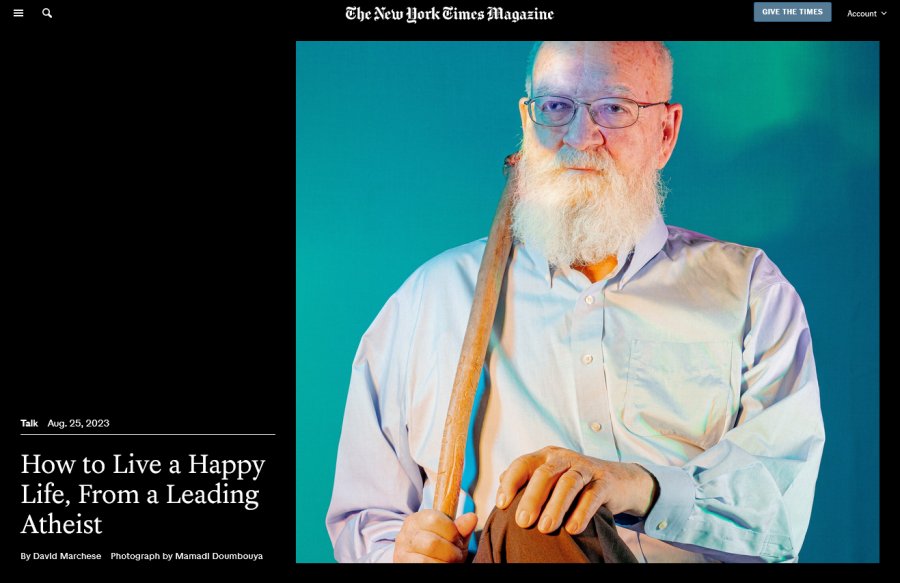- Vivek Ramaswamy’s simplistic 10 “truths” includes one about the primacy of the nuclear family (compare my post two days ago);
- E.J. Dionne Jr. about how Republicans are focused on three different “yesterdays,” all since the 1980s, and not the future;
- Paul Krugman on the idiocy of Trump’s call for a 10% tariff on all imports;
- And finally, an excerpt from an interview with Daniel C. Dennett, who has a new book, an autobiography, coming out soon.

In a follow-up to my post two days ago, about the possible obsolescence of the “traditional” nuclear family in the US, is the list of Vivek Ramaswamy’s simplistic “10 Truths” or “10 Commandments”. All of these are arguable, and some are flat wrong (“Human flourishing requires fossil fuels,” an argument to maintain current entrenched interests which, he apparently refuses to understand, drives climate change, which he has said is a hoax). Also among the ten is “The nuclear family is the greatest form of governance known to mankind.” So there you are; consider the source. (Meanwhile, some wags have noted that Ramaswamy is Hindu, and on the point of his first truth, have asked, which one?)
\\
Meanwhile, another take on the conservative/Republican worship of a mythical past golden age.

Washington Post, E.J. Dionne Jr., 27 Aug 2023: Opinion | Republicans are stuck in three yesterdays
What are the three? Dionne spells them out in the third paragraph, in light of Trump’s recent booking at the Fulton Country Jail, and his non-appearance at the presidential debate the night before.
Both events underscored that differences in the party are defined in large part by competing loyalties to three political yesterdays: First is the one associated with Trump. The second is the tea party rebellion during the Obama years. And the third — glowing in a sacred conservative stratosphere — is the tradition of Ronald Reagan.
So it’s not entirely about returning to the social landscape of the 1950s, it’s partly about more recent hero worship.
Trump’s “again” in his MAGA slogan thus does a lot of work. It certainly speaks to a nostalgia in his largely White constituency for old racial and cultural arrangements. Trump offers racist texts and subtexts, bows to religious traditionalism and tosses in some old-fashioned red-baiting. Channeling his legal hero Roy Cohn, Joe McCarthy’s henchman, Trump has taken to attacking his opponents as “communists.” Now that’s throwback politics for you.
\\
Also, Paul Krugman on the simplistic absurdity of Trump’s proposal for a 10% tariff on all imports.

NY Times, Paul Krugman, 24 Aug 2023: Trump, Lord of the Ring (Around the Collar)
After making fun of Trump’s backward use of the advertising slogan “ring around the collar,” Krugman explains
OK, on to the economic substance. A tariff would, of course, be a tax — a tax that would, whatever Trump may assert, fall on U.S. families, probably disproportionately hitting lower-income households. It would also push consumers into buying higher-cost, lower-quality goods, because that’s what protectionism does, making America as a whole poorer.
But focusing on the economic costs of Trump’s ring around the collar misses the main reasons his idea is so bad.
Krugman goes on with details. Economics and global trade is complex. Republicans don’t do complexity; they do simplistic black and white thinking. Krugman concludes,
You may or may not approve of Biden’s break with free-trade orthodoxy (I do), but it’s certainly not stupid.
Trump’s ring around the collar, by contrast, is stupid. It’s hard to see any rationale for his tariff beyond the crude idea that imports are bad and that a tariff would reduce the trade deficit (which it probably wouldn’t).
And Trump’s mindless protectionism is a symptom of a broader disdain not just for expertise but for any kind of hard thinking — a disdain that has infected pretty much the whole Republican Party.
So while Trump’s tariff ideas aren’t the biggest thing to worry about if he regains power — they may not even make the top 10 — they add to the reasons that his possible reoccupation of the White House should make you very, very afraid.
\\\\\
OK, let’s turn our attention from the dumbest 20% of the population, and how they are making life difficult for the rest of us, to the 1% smartest and wisest.
First, a big feature now online for what apparently will appear in print in next weekend’s New York Times Magazine.
NYT Magazine, profile/interview by David Marchese, posted 25 Aug 2023: How to Live a Happy Life, From a Leading Atheist
Dennett is a philosophy who often writes on scientific topics, like evolution, the mind, and religion. I posted notes about his book on the latter subject, Breaking the Spell, here, here, and here. He has a new book, an autobiography called I’ve Been Thinking, coming out October 3rd. (I learned this today from Jerry Coyne’s site.)
The interview is fascinating. Here’s the lead in:
For more than 50 years, Daniel C. Dennett has been right in the thick of some of humankind’s most meaningful arguments: the nature and function of consciousness and religion, the development and dangers of artificial intelligence and the relationship between science and philosophy, to name a few. For Dennett, an éminence grise of American philosophy who is nonetheless perhaps best known as one of the “four horsemen” of modern atheism alongside Christopher Hitchens, Richard Dawkins and Sam Harris, there are no metaphysical mysteries at the heart of human existence, no magic nor God that makes us who we are. Instead, it’s science and Darwinian evolution all the way down. In his new memoir, “I’ve Been Thinking,” Dennett, a professor emeritus at Tufts University and author of multiple books for popular audiences, traces the development of his worldview, which he is keen to point out is no less full of awe or gratitude than that of those more inclined to the supernatural. “I want people to see what a meaningful, happy life I’ve had with these beliefs,” says Dennett, who is 81. “I don’t need mystery.”
And then I’ll quote just one question (by the interviewer) and answer.
We have a soul, but it’s made of tiny robots. There is no God. These are ideas of yours that I think a lot of people can rationally understand, but the gap between that rational understanding and their feelings involves too much ambivalence or ambiguity for them to accept. What is it about you that you can arrive at those conclusions and not feel adrift, while other people find those ideas too destabilizing to seriously entertain? Some people don’t want magic tricks explained to them. I’m not that person. When I see a magic trick, I want to see how it’s done. People want free will or consciousness, life itself, to be real magic. What I want to show people is, look, the magic of life as evolved, the magic of brains as evolving in between our own ears, that’s thrilling! It’s affirming. You don’t need miracles. You just need to understand the world the way it really is, and it’s unbelievably wonderful. We’re so lucky to be alive! The anxiety that people feel about giving up the traditional magical options, I take that very seriously. I can feel that anxiety. But the more I understood about the things I didn’t understand, the more the anxiety ebbed. The more the joy, the wondrousness came back. At the end of “Darwin’s Dangerous Idea,” I have my little hymn to life and the universe.
That’s my God — more wonderful than anything I could imagine in detail, but not magical.
\\
I have another such item about the new book by Marcelo Gleiser, but that will have to wait.






